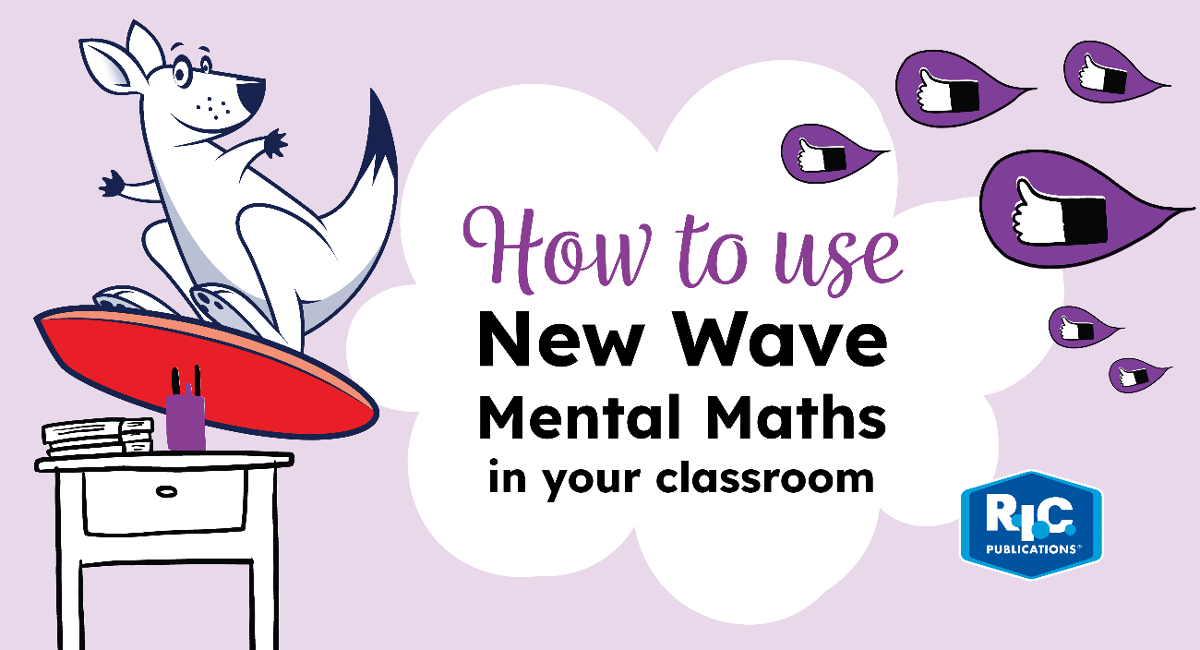- Thursday 10 April 2025
- 0 Comments
In today’s fast-paced educational environment, solving problems quickly and accurately is important.
Mental maths, or the ability to perform calculations without using a calculator or paper and pencil, is an important component of mathematical fluency.
Our New Wave Mental Maths books do just that. These resources ensure that students interact with the material meaningfully!
Here are some strategies we can recommend:
Warm-up Exercises
It’s helpful to begin each lesson with a brief warm-up exercise before working on the more challenging problems in the book.
This can include simple mental maths questions that students can answer quickly, either individually or as a class. These exercises should review previously learned concepts and help activate the students’ prior knowledge.
Warm-up exercises could include:
- Rapid-fire drills on addition, subtraction, multiplication, or division.
- Flashcards or timed quizzes to get students thinking quickly.
The goal of these warm-up exercises is to engage students' minds and prepare them for more complex tasks ahead.
Focus on Developing Strategies
One of the main goals of mathematics is to develop strategies for solving problems quickly and efficiently. Rather than simply emphasising correct answers, NWMM also encourages students to explore different strategies to reach the solution.
For example:
- Breaking numbers apart (e.g. decomposing numbers to simplify multiplication or division).
- Using near doubles (e.g. 8 + 9 can be thought of as 8 + 8 + 1).
- Using place value (e.g. multiplying 24 × 5 by thinking of it as (20 × 5) + (4 × 5)).
Encourage students to explain their thinking and share their strategies with the class. This reinforces their understanding of mathematics techniques and helps develop their mathematical reasoning.
Use challenges to build confidence.
A significant aspect of mathematics is solving problems quickly.
Timed challenges or ‘math races’ can help students develop speed without sacrificing accuracy. These challenges can take the form of individual pages in your book with a time limit or competitive group activities where students work in teams to answer as many problems as they can in a set amount of time.
Be sure to balance speed with accuracy – students should be encouraged to aim for both fast and correct solutions. Over time, they’ll develop the confidence and efficiency needed for mental calculations in both classroom and real-world situations.
Differentiation for Diverse Learners.
Not all students will be at the same level of ability when it comes to mathematics, so differentiation is key.
New Wave Mental Maths has problems of varying difficulty, so teachers can use this to meet the needs of all students, from beginners to advanced learners.
Differentiation strategies include:
- Providing simpler problems for students who need more practice or who struggle with certain operations.
- Offering advanced challenges at upper levels of the books or bonus problems for students who have mastered the basics and need an additional challenge.
- Allowing students to work at their own pace, either individually or in small groups, to ensure everyone is challenged but not overwhelmed.
Encourage Reflection
After completing an exercise or activity, students need to reflect on their work and assess their own progress.
This can be done through class discussions, peer reviews, or self-assessment checklists. Students should be encouraged to ask questions like:
- What strategies did I use to solve these problems?
- Where did I make mistakes, and how can I correct them?
- How confident do I feel with mental math?
Reflection helps students think about what they have learned and recognise areas where they may need more practice. This also fosters a growth mindset, where students understand that mistakes are part of the learning process.
Wrap-up
Using these resources in the classroom can significantly enhance students' mathematics skills when paired with effective strategies!
By incorporating warm-ups, differentiated instruction, and encouraging reflection, teachers can help students build confidence, speed, and accuracy in mental math.
Ultimately, the goal is not only to improve skills but also to encourage a love for maths that will serve students in many areas of their everyday lives.
With consistent practice and consolidation, mental maths can become a powerful tool for students – one that can support them in mastering mathematics and beyond!
